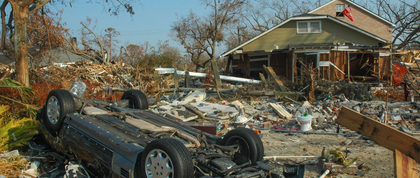
A damaged home and overturned car in Gulfport, Mississippi in the wake of Hurricane Katrina. Photo credit: MichaelWarrenPix/Getty Images
Source: NYU News
GPH’s Alexis Merdjanoff reflects on two decades of data about long-term resilience and how we can better support health and safety in the aftermath of the next storm
Hurricane Katrina—which made landfall in Louisiana in August 2005—is among the worst natural disasters to ever hit the United States, devastating communities across the Gulf Coast and forcing more than 1.5 million residents to evacuate their homes.
It’s well established that the destruction and grief caused by hurricanes and other natural disasters can harm mental health in the short -term. A new analysis co-authored by NYU School of Global Public Health’s Jonathan Purtle found that suicides and drug overdoses spiked among local residents right after the Maui wildfires, and other studies have shown an uptick in psychiatric medications prescribed to Californians in the six weeks after nearby wildfires.
But what happens after the cameras leave and federal assistance and recovery programs end? And why is it that some people can recover quickly after a disaster, while others struggle for years?
These questions are central to research led by Alexis Merdjanoff, the director of the environmental public health program and assistant professor of social and behavioral sciences at NYU School of Global Public Health. As a sociologist, Merdjanoff focuses on the long-term recovery and resilience in populations affected by disasters, from Hurricanes Katrina, Sandy, and Ian to the Deepwater Horizon oil spill.
“Recovery programming is often focused on the first three to six months after a disaster, but people still need help after that time,” says Merdjanoff. “They may not realize what they need until their housing is settled and their kids are back in school. After those more immediate needs are met, they may require a small business loan or mental health services.”